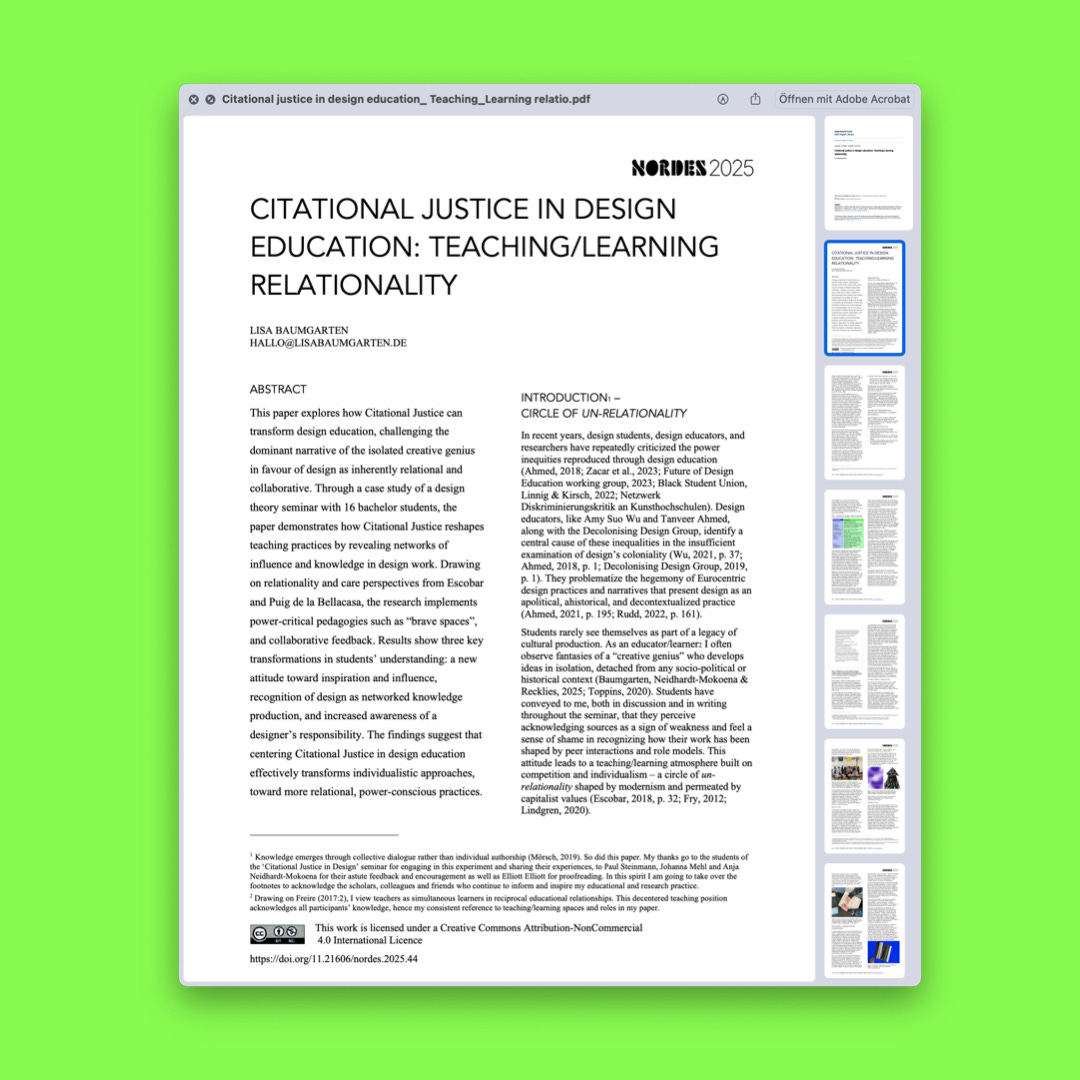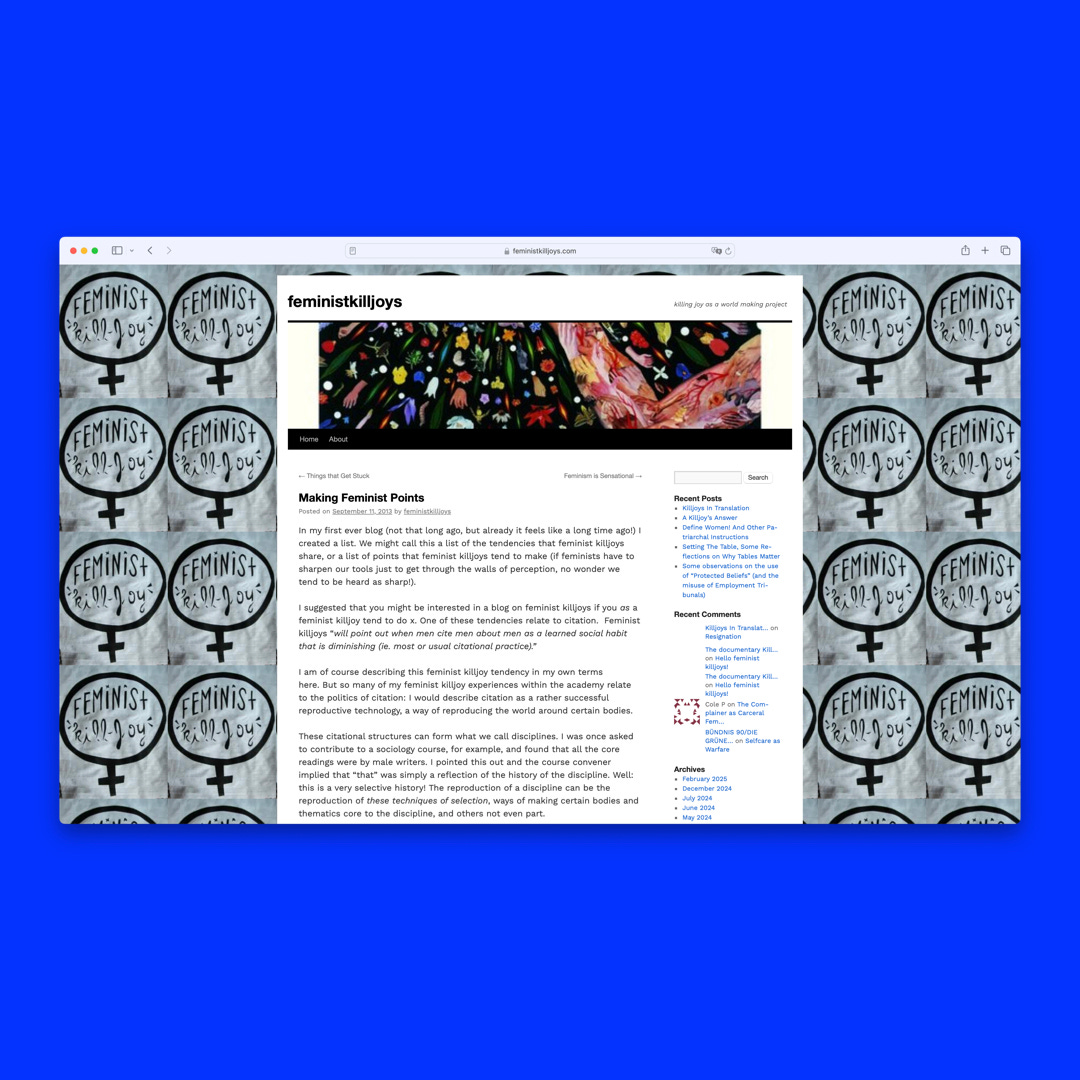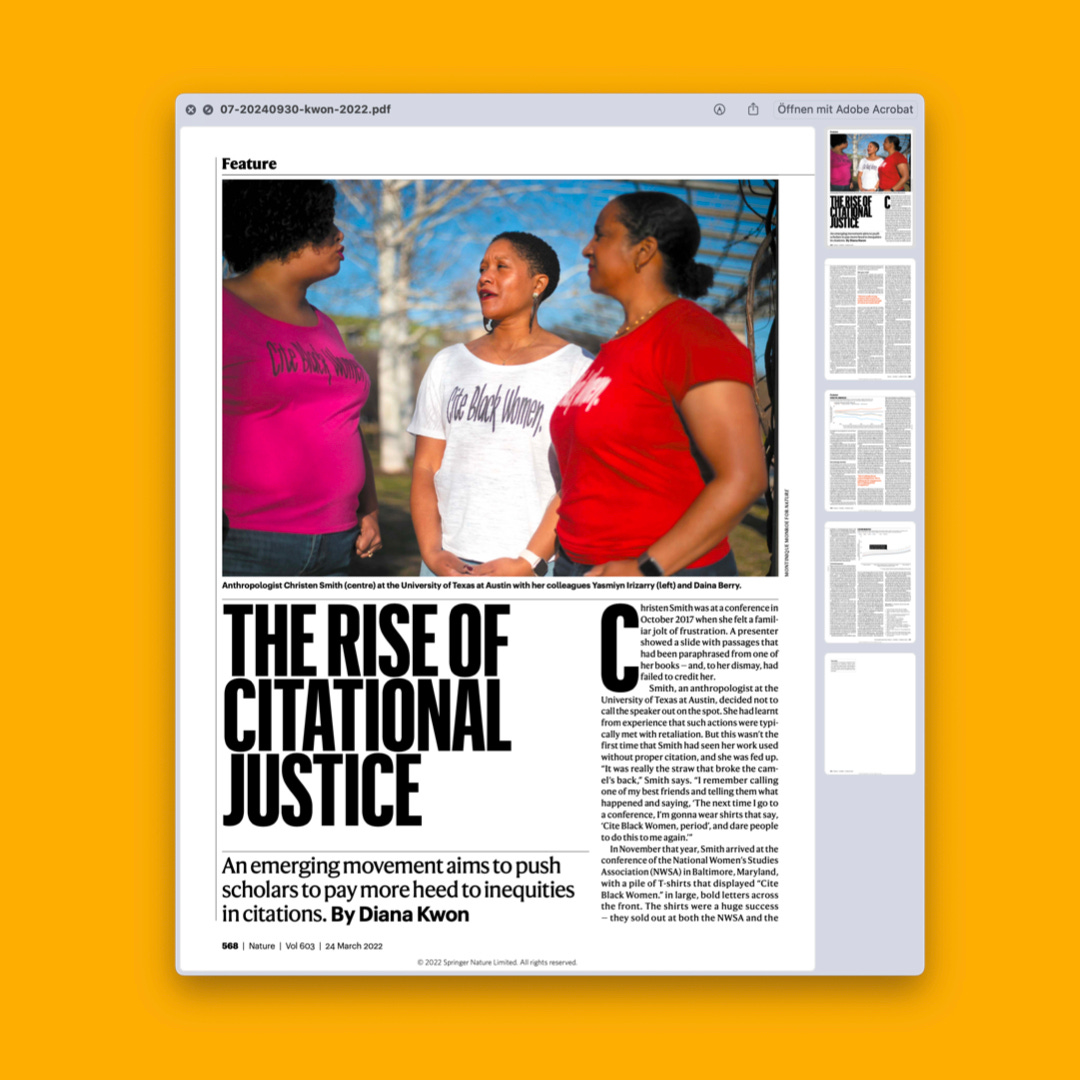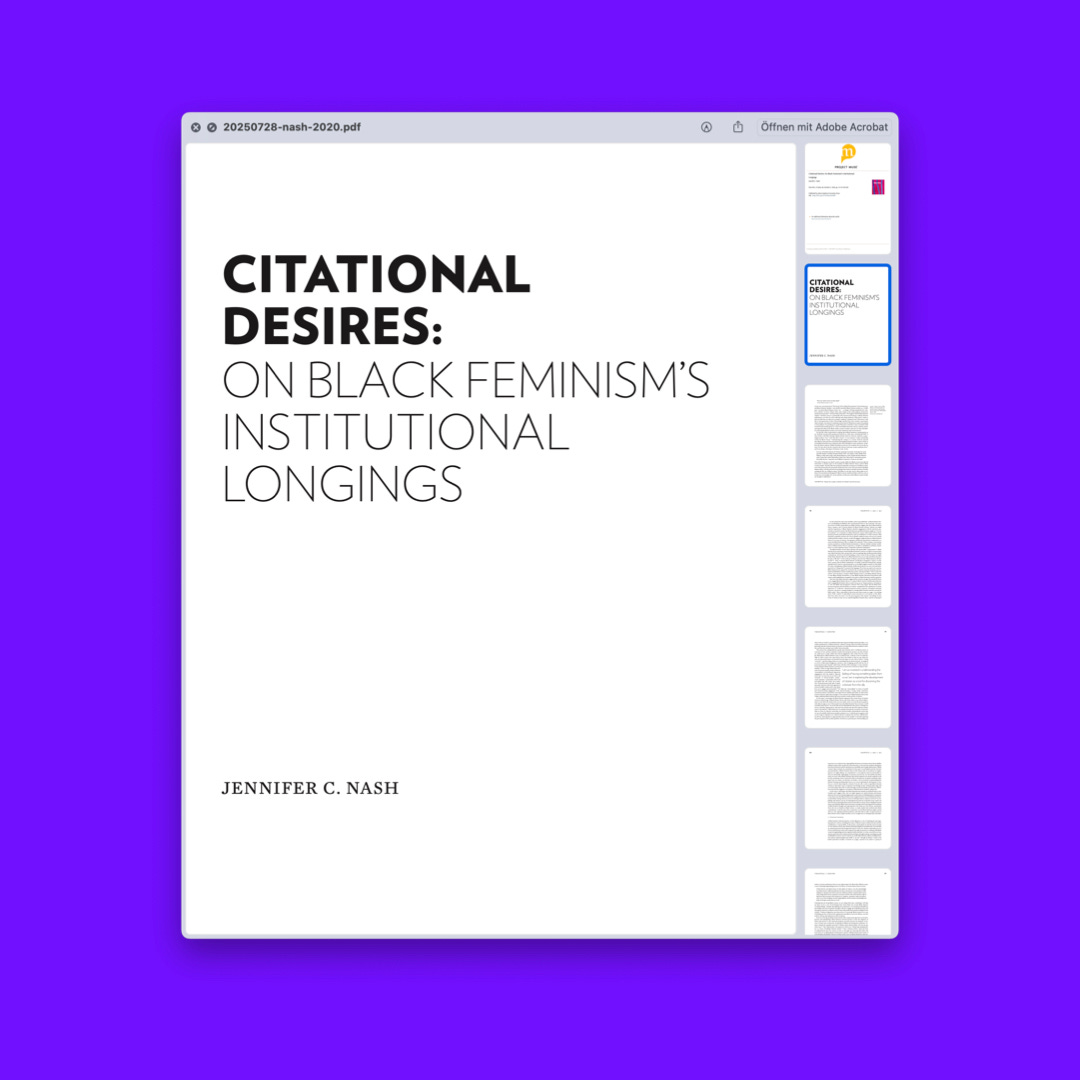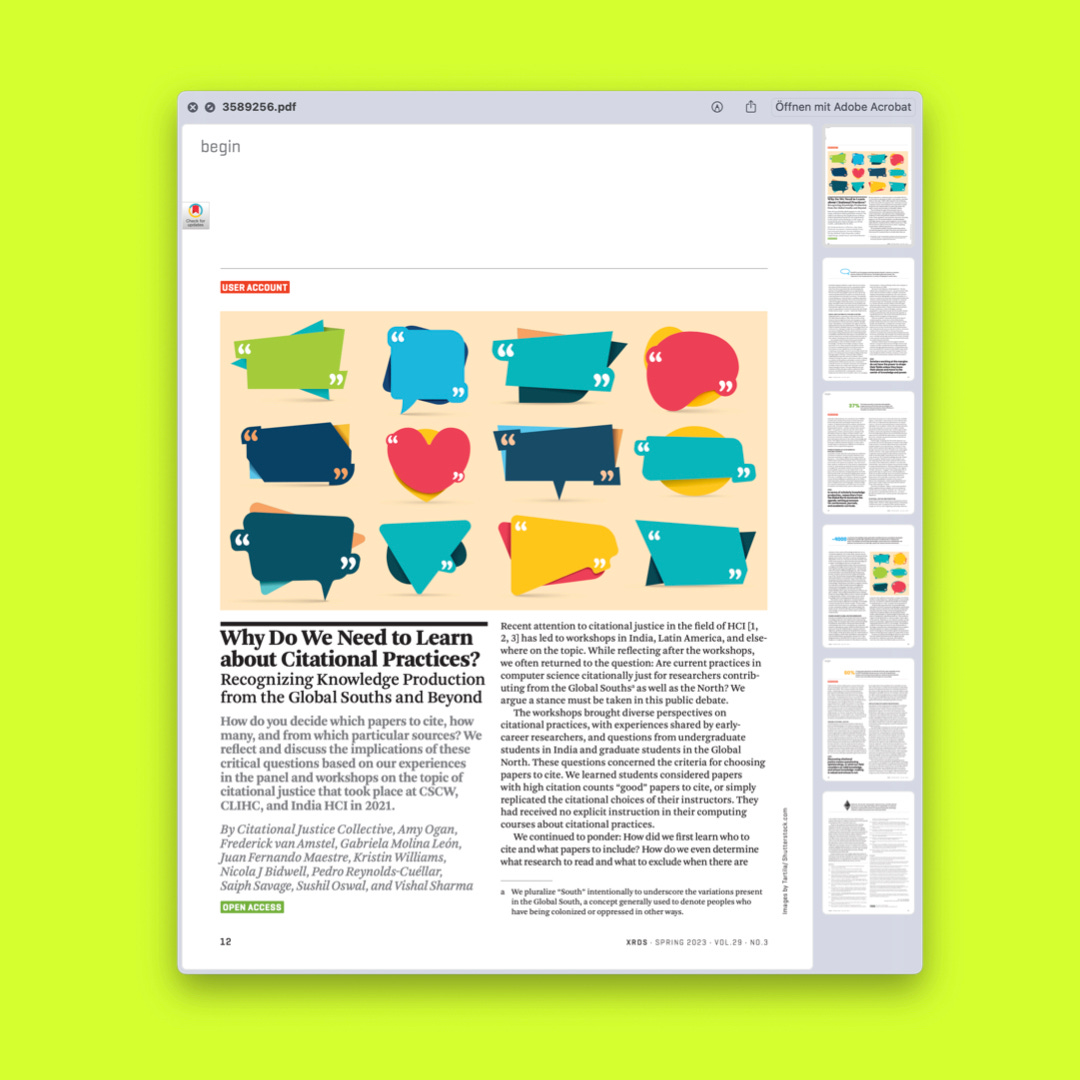Teaching Design – Infrequent Newsletter #10
Citational Justice in Design
Dear design teachers/learners,
thanks for subscribing (or staying subscribed) to this mailing list and following the research project!
This newsletter edition #10 is about citational practices in design—turning uncomfortable experiences into productive conversations.
Over the past years, I've found myself repeatedly navigating situations where my contributions were misrepresented, or simply erased from projects and discussions. Each time I had to request proper acknowledgment, to become what felt like the fussy killjoy demanding credit where credit was due. These experiences, while frustrating, sparked questions about how we practice citation and recognition in design.
Rather than letting these negative experiences fester, I've decided to bring them into my teaching practice. In the winter semester 2024/25, I facilitated a design theory seminar called »Citational Justice in Design« at Hochschule Mainz that used these personal experiences as a starting point for exploring citational practices in design with bachelor students. We were examining (amongst other things) why crediting historically seems to be such an ›untried practice‹ in design, discussed wether and probed how to implement citations in design work, grappled with the realities of a competitive design field and practicing solidarity nonetheless, developed guiding questions (see »Design Activities«) and explored the potentials of citational justice for design from 16 perspectives in a collaborative publication.
I'll be presenting a paper based on the seminar work at NORDES 2025 in Oslo next week (6–8th Aug), and I'm excited to share some resources and insights from that research in this newsletter.
Thanks to the students of the »Citational Justice in Design« seminar for engaging in this (sometimes challenging) experiment and for sharing your reflections with me!
If you happen to be at NORDES too, come say Hi!
Warm wishes and until next time,
✌🏻 Lisa
Design Activities
In class/ When working on a design project:
Reflect on the following questions (1) individually, (2) in smaller groups. Discuss your reflections and make notes. Come up with 1-3 specific actions towards citational justice you can explore in your next design or design research project.
The questions presented here emerged from collaborative work by students enrolled in the »Citational Justice in Design« seminar at Hochschule Mainz during the winter term of 2024/2025. Drawing inspiration from Christina Templin's (2020) guidelines for citational justice in scientific research, these students adapted her framework to create a new set of questions specifically tailored for design practice. The final compilation was edited and translated by Lisa Baumgarten.
Added to the bibliography
Baumgarten, Lisa (2025). Citational justice in design education: Teaching/Learning relationality, in Brandt, E., Markussen, T., Berglund, E., Julier, G., Linde, P. (eds.), Nordes 2025: Relational Design, 6–8 August, Oslo, Norway.
This paper explores how Citational Justice can transform design education, challenging the dominant narrative of the isolated creative genius in favour of design as inherently relational and collaborative. Through a case study of a design theory seminar with 16 bachelor students, the paper demonstrates how Citational Justice reshapes teaching practices by revealing networks of influence and knowledge in design work. Drawing on relationality and care perspectives from Escobar and Puig de la Bellacasa, the research implements power-critical pedagogies such as »brave spaces«, and collaborative feedback. Results show three key transformations in students’ understanding: a new attitude toward inspiration and influence, recognition of design as networked knowledge production, and increased awareness of a designer’s responsibility. The findings suggest that centering Citational Justice in design education effectively transforms individualistic approaches, toward more relational, power-conscious practices.
→ Access the paper here.
Ahmed, Sara (2013). Making Feminist Points. Blog entry, 11.9.2023.
»When we think this question ›who appears?‹ we are asked a question about how spaces are occupied by certain bodies who get so used to their occupation that they don’t even notice it. They are comfortable, like a body that sinks into a chair that has received its shape over time. To question who appears is to become the cause of discomfort. It is almost as if we have a duty not to notice who turns up and who doesn’t. Just noticing can get in the way of an occupation of space.«
→ Access the blog post here.
Kwon, Diana (2022). The Rise of Citational Justice. In: Nature, Vol 603, 24.03.2022, pp. 567–572.
»(…) studies in bibliometrics have revealed persistent biases in citation patterns — women and people of colour, for instance, garner citations at lower rates than men do. An increasing number of researchers are calling on academics to acknowledge the inequities in citational practices — and, by paying more heed to work from groups that are typically under-cited, take action to reduce them. Some are referring to this idea as ›citational ethics‹ or ›citational justice‹.« (p. 569)
→ Read the article here.
Templin, Christina (2021). Why Citation matters: Ideas on a feminist approach to research. In: Blog Abv Gender- & Diversitykompetenz, FU Berlin.
»Research in academia today has a highly standardized and institutionalized approach to citation with only a few generally accepted forms on how to reference our work. (…) Following the logic of continuous progress in scientific research, where each work builds on each other, we learn that it is necessary to thoroughly reflect on the work that has already been done on a specific question, to be able to draw new conclusions from enquiring, criticizing or highlighting new aspects of a problem. This makes it possible to distinguish the authors ideas from someone else’s while acknowledging the impact of previously published work, not only to avoid plagiarism but also to give credit to the source of our ideas and to be able to evaluate the stringency of our argument (Logik des Zitierens).
What we often don’t realize is that the knowledge we consume, produce and reproduce in this process isn’t neutral. As Pat Thomson puts it in a blogpost: ›Who cites who is not a neutral game.‹ (2018).«
→ Read the paper here.
Nash, Jennifer C. (2020). Citational Desires: On Black Feminism's Institutional Longings. In: Diacritics 48, no. 3, pp. 76–91.
»In this essay, I interrogate why Black feminists have pinned our political hopes to citationality and I suggest other ways we might organize our political desires and dreams, always in the service of producing generative and creative worldmaking theory and praxis. I trace three ways that Black feminists have imagined citation as potentially preservationist and ethical: tracing citation as a form of undoing violence, citation as a form of ›un-forgetting,‹ and citation as an act of critical generosity and care.« (p. 80)
Citational Justice Collective (Ogan, A.; van Amstel, F.; León, G. M.; Maestre, J. F.; Williams, K.; Bidwell, N.; Reynolds-Cuéllar, P.; Savage, S.; Oswal, S.; & Sharma, V.) (2023). Why Do We Need to Learn about Citational Practices? Recognizing Knowledge Production from the Global Souths and Beyond. In: XRDS 29, 3 (Spring 2023), pp. 12–17.
»Everyday citational practices that appear rational and fair can preserve dominant knowledge systems and continue to stifle contributions from underrepresented scholars through oppressive patterns. Citing authors who have centralized the citations in their fields is expected of any new research because it must both engage with and acknowledge the field’s scholarly consensus. At the same time, these central authors usually come from western, educated, industrialized, rich, and democratic (WEIRD) societies since scholars from those societies have been historically admitted to privileged communities.« (pp. 13–14)
→ Access the paper here.
ongoing Open Call
We invite contributions from you; design educators, students, alumni, researchers, pedagoges, enthusiasts and others to submit and share the sources which are reference points and/or inspiration to your practice! Your contribution will be published in our infrequent newsletter and in our text-based bibliography.
→ Find out how to contribute here.
Info
Teaching Design started as a collectively gathered bibliography focusing on design education from intersectional feminist and decolonial perspectives. Since its launch in September 2019, it has expanded into conversational formats, workshops, a temporary library and a space for reflections, which all has led to the platform in its current form.
Currently the bibliography as well as this newsletter is curated and edited by Lisa Baumgarten unless mentioned otherwise.





